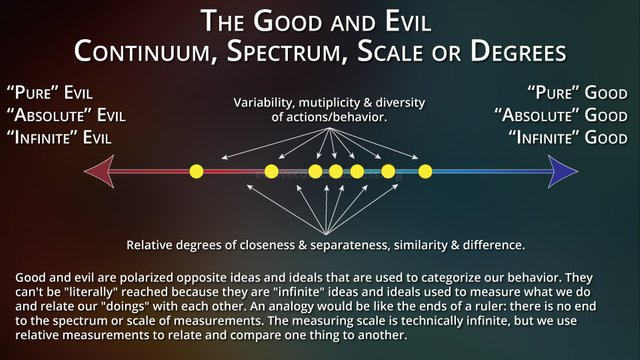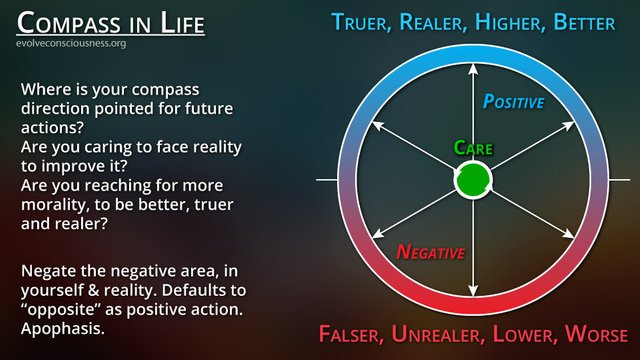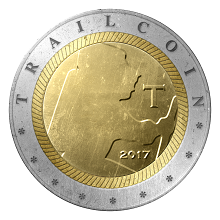What is Good or Evil? The Good and Evil Continuum, Spectrum, Scale or Degrees
This is good, that's not good. This is bad/evil, that's not bad/evil. Good how? Bad/evil how?
Depending on the contextual reality surrounding an action there are ways to determine how to categorize it.
For example, the killing of another may be in self-defense against their aggression, or as an act of murder to take the life of someone that wasn't harming another. These are both absolute categorizations that can be determined, yet they are *relative to each other.
What is Good or Evil?
Some of the confusion with good and evil is that people think its "absolute", "pure" or "infinite" in its application for being capable of understanding such ideas and ideals to live by. Some people think you're either "good" or "evil", in some "absolute" capacity, while others reject such a fallacy and throw out everything in an ignorance and denial of understanding what is good or evil, and claim "there is no good or evil/ right or wrong". Both types of thinking are wrong and further the confusion.

Something is more good relative to something else that is less good. Something is more bad relative to something else that is less bad. This places everything on a scale, continuum or spectrum for categorization.
There is a great deal of variability, multiplicity and diversity to our actions and behavior.
Good and evil can be conceptualized as being part of one spectrum, where going more towards one side, means less of another.
If you don't murder, that's good, but if you do steal, that's bad. People aren't purely good or evil. The actions they engage in, the behavior they express, is good or evil in varying degrees of strength towards one polarity or the other. Each polarity is an idea, as an ideal -- "absolute", "pure" and "infinite" -- that actions can be relatively positioned in a continuum, spectrum, scale or degrees to understand their relationship to each other.
Is There a 'Literal' Good and Evil?
Good and evil are polarized opposite ideas and ideals that are used to categorize our behavior. They can't be "literally" reached because they are "infinite" ideas and ideals used to measure what we do and relate our "doings" with each other. An analogy would be like the ends of a ruler: there is no end to the spectrum or scale of measurements. The measuring scale is technically infinite, but we use relative measurements to relate and compare one thing to another.
The words we use are symbolic constructs to help us understand reality more by defining what happens in reality. Good and evil are used for that purpose in terms of the type of actions we engage in that have consequences for others. The same is so for moral and immoral, or right and wrong.
There is no literal "good or evil" existing as something in itself, just as there is no literal "action" that exists as something in itself, or literal "emotion" that exists. These are all references for what we do and create. Emotions reference and correspond to electro-chemical physiological processing that we feel. Actions reference and correspond to the power of our hands, feet, bodies or voice to affect or create change. Good and evil reference and correspond to the type of actions we create.
Relativity?
Actions are a general categorization, while specific behavior can be further defined in terms of right-action and wrong-action, moral and immoral, or good and evil.
Actions, experiences, conceptions, etc. never reach the polar opposite ends. The variability, multiplicity and diversity of expression falls between the poles.
"Everything is relative" (i.e. has a relation) to other things on the scale in varying degrees of similarity and difference in progression towards one end or the other. Therefore, comparison is a necessary tool throughout life. This doesn't mean there is no objective morality to comprehend and attribute towards actions by engaging in some form of false moral comprehension as "moral relativism" or "subjective morality".
Good and evil can't be dismissed through the attempted negation of discernment by clumping everything together as if "there is no good or evil", or "that's dualistic and negative thinking", or "it's all part of one thing" that doesn't accurately reflect reality and the ability to discern actions as being more right or wrong than others, or more good than evil, etc.
I'm explaining how the words good and evil exist as symbols to reference reality. Good and evil are part of reality as long as we have actions and can conceptualize abstract definition such as we do. Just as much as love and fear are a part of reality that we can categorize for our emotional changes. Each are part of a complementary dualistic framework. Duality isn't bad, duality is part of existence and life. Thinking duality is bad is what's bad. Denying duality prevents a more accurate perceptions of reality as it is.
In varying degrees of relativity, there are things that fall into a neutral ground if we want to get even more specific to understand the varying levels of actions. We can see the position of something as being relatively neutral, more good than bad, or more bad than good. But that will have to be for another post.
Thoughts and emotions are our tools and guides to determine the objective differences between what exists and make choices in life. For the existence of morality, it is our actions and behaviors that are created and being described. Actions we (and others) engage in can be the same actions in the same context, or different in varying degrees.
The various degrees of closeness and separateness (or similarity and difference) between properties or characteristics allows for analysis, diagnosis, evaluation, assessment, discernment, distinction, correspondence, correlation, comparison, association, identification, and judgment. Judgment is also part of life, not some "bad" thing either.
Our ability to discern actions accurately can vary as well. We have many biases to be aware of, and emotions that can steer us away from an objective appraisal of our own or other's actions. We can often feel a wrong-doing in our bodies and know it in our minds.
We can also be wrong and misled, duped, hoodwinked, bamboozled, conned, tricked, fooled, manipulated and deceived into false modalities of expressing consciousness -- our thoughts, emotions, actions.
We can come:
- to believe things that aren't true
- to "feel-good" about things that aren't good
- to be inculcated, invoked, and summoned with emotions through the power of word-magic "spells" and the science of imagery delivered by rhetoric, sophistry, storytelling and narratives
- and as a result of having our thoughts and emotions influenced by others, we then engage in behaviors and actions that reflect the thoughts and emotions we now have
With our tools in consciousness developed and used properly, we have a compass in life that can guide our actions and behavior by being able to objectively recognize what our behavior is doing in reality. Cause and effect is beautiful to understand how we can apply objective understanding to things.

Using and continually developing these tools, we can make choices and decisions that result in actions, behaviors and habits that we recognize to be better, more-accurate, more-correct, more-right, more-good, more-true and more-moral than others.
In no way does this give credence, merit, or validation to the fallacy of false moral understanding like "subjective morality " or "moral relativism", i.e. “there is no good or evil” or "there in no right or wrong", etc.
Attempts to negate the good and evil spectrum can arise:
- from falsely attributing the concept of good and evil with "absolutes", "extremes", polarized myopic perceptions
- from invalidating dualistic conceptual frameworks
- from negating thoughts or emotions as the tools for discernment
- from negating the development of using those tools
- or from negating the ability to relate, compare, discern, distinguish, differentiate, evaluate, judge
I have seen all of the above employed in people who ascribe to the identity and beliefs of being a "New Ager". "Don't compare", "don't judge", "thinking is flawed", "follow your feelings not thinking", "logic is flawed, follow feelings", "duality is bad". I have literally heard this before from confused consciousnesses.
Dismissing, denying or ignoring a comprehension of good and evil is an effective method to validate, justify, excuse, defend and "feel-good" about ourselves and our current choices, decisions, actions, behaviors and habits. Then we don't have to change.
People can then be content to not discern reality for what it is and do something about it. There is nothing to do, right? It's all just "whatever" with nothing right or wrong and everyone can just believe in whatever self-deluded fantasy they want in order to remain attached to how "good" they think they are and not need to change anything.
If our lives and the world is to change to a better, more-accurate, more-correct, more-moral and more-right way to live, we need to stop denying the validity of categorizing actions and behaviors. We need to instead actually learn how to discern the difference between truth and falsity, right and wrong, moral and immoral, and good and evil. Then we can know what is right to do and what is better to do, by actually understanding what is wrong to do and what is worse to do.
We need to unbecome, unlearn, and learn what not to be; then being and becoming more good, more right and more moral flows as part of not doing the opposite.
Thank you for your time and attention! I appreciate the knowledge reaching more people. Take care. Peace.
If you appreciate and value the content, please consider:
Upvoting  , Sharing
, Sharing  or Reblogging
or Reblogging  below.
below.
Please also consider supporting me as a Steem Witness by voting for me at the bottom of the Witness page; or just click on the upvote button if I am in the top 50:

@krnel
2017-02-13, 5:01pm

Hello @KrNel,
Congratulations! Your post has been chosen by the communities of SteemTrail as one of our top picks today.
Also, as a selection for being a top pick today, you have been awarded a TRAIL token for your participation on our innovative platform...STEEM.
Please visit SteemTrail to get instructions on how to claim your TRAIL token today.
If do not wish to be promoted by SteemTrail, please reply with "Stop" to opt out.
Happy TRAIL!

Thanks ;)
Brilliantly stated! It has long amused me how critics of absolutism can somehow get to a point where they are-- in effect-- "absolute" relativists. Huh?
I often run into the argument that "taking someone's life" is inherently "evil," but if that person is doomed to die a slow and excruciating death from an incurable illness, is taking their life still "evil?" I would surmise not.
Of course, I am sure you also run into the position that "intellectualizing" how human motivation, morals and the psyche work is just "a highbrow way to avoid dealing with one's authentic feelings." Again, another all-or-nothing stance.
Duality absolutely exists (which is say as someone who spent a decade+ in pursuit of experiencing non-duality); it's hard to experience "light" without an understanding of "dark;" we can't define "good," absent evil as a defining counterpoint.
Yes, for the definition of a dualistic conceptual framework, the opposite is required. But, if no one was engaging in evil actions, evil would not be present for us to distinguish, and evil would not exist by our actions, but good would exist by default despite us referring to it by some other name, maybe, since it would just be "what is", and "what is" is truth level 1 of the current condition, and truth level 2 is the way things should be, so if what is is what should be, we are already in good and it's simply reality = truth = good without us needing to recognize it. Thanks for the feedback.
This is one of my favorite topics. The same people that subscribe to the moral relativist position are the ones responsible for the self esteem movement that has prevaded American education. Reason has been replaced by emotivism. Without logic or reason, people are unable to distinguish between right and wrong. Things that "feel" good are seldom moral. I realize that the old Star Trek series was merely fiction, but the dynamic between Spock who viewed reality only in terms of logic and the Captain whose emotional reactions (most often anger) was most telling. Moreover, it is difficult to apply terms like good and evil to people (a common fallacy) in their entirety. For example, Hitler (everybody's favorite example) we generally view as an evil person. But not ALL of his actions were evil. He loved animals and was instrumental in fomenting laws prohibiting animal cruelty, even to those that were to be killed for food. A different scale is necessary; perhaps a linear scale with a balance where actions can be "stacked" on either side of a center point in relationship to the moral impact on other people. Forgive me, I'm rambling...your posts get me thinking and this seems to be the result lol!
Indeed, no one can be pure good or evil, but they an embody different aspects of each polarity. Evolving consciousness requires a conscious awareness of willful effort to align with the good over the evil, moral over immoral, truth over falsity. That's the purpose of all human beings. Thanks for the feedback, and I'm glad my posts get you thinking, that's intended :)
Thank you...Without the ability to think critically, one cannot distinguish truth from falsity- hence the focus on a feelings based curriculum in public education. It's all by design.
I think subjective morality is just a mask, a ‘false self’ leading a person to risk the mental health caused by conformity to the world or fear of confrontation with others people's values or even their own.
Nietzsche said that to have faith was "not wanting to know what is true." and hope was the worst of all evils "because it prolongs the torments of man."
This post took brought to my memory a remarkable quote from Immanuel Kant.
"The only objects of practical reason are therefore those of good and evil. For by the former is meant an object necessarily desired according to a principle of reason; by the latter one necessarily shunned, also according to a principle of reason."
The way in which I define good vs. evil is very simple indeed- if you live by the golden rule and realize that your rights end where another being's begins and you respect Natural Law then I consider you GOOD.
If however you are focused on service to self with the 'anything goes' mindset, and ignore the unalienable rights of others then you are evil.
That's the way I dice it up.
My process of unlearning began in 1993 when it was brought to my attention that the church my parents took me to in my youth practiced things that were not according to the Bible. It went into overdrive in 1995 after getting involved in a network marketing group. Both of these experiences greatly intensified an already voracious reading habit, and I'm glad it did.
please allow me to inform you that where it says "more good", it should say "better".
good is = god
evil =Eventually Very Ignorant Level :P ahahah
Bad= being or anormal device ahahah
I wrote a comment, but it got too long, so I posted it as a separate article.
https://steemit.com/morality/@heretickitten/objective-morality-is-a-fabrication-you-need-to-invent-your-own-moral-code-and-be-aware-that-you-made-it-up-there-is-no-truth-to
Enjoy, @krnel
I hope it doesn't come off as too harsh, but I do like being poetic with words.
Have a nice day.
Well thought out and presented.
Good and Evil are complicated things and all actions in the spectrum have a relative spacing to each other, as not all actions have an absolute goodness or evil parameter.
Saving a life is good, but what if saving one life endangers hundreds more?
Is that good, for who is it good should hundreds die as a result?
What about good and evil in economic categories?
Does propping up a failing economy by raising interest rates to unreal heights serve as good when in the short term more people will die from starvation, or cold temperature from not being able to afford these things? Afford their mortgage or ability to fuel their car due to a carbon tax on gas/gasoline?
Is it good to send people to prision to profit of them being there for petty crimes in which there is no actual victim?
Such as large area this question encompasses.
To save one life endangers others? How?
A large part of economics is done in fantasy land of inventions that harm us more than help us. Derivatives are the most extreme example, but the market itself is a sham.
Prisons shouldn't even exist. Communities and environments, if not only parents, need to be more responsible for what they influence and raise, although there are some cases of genetic abnormality towards psychopathy, etc.
Thanks for the feedback.